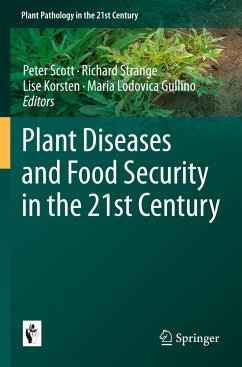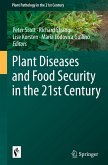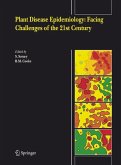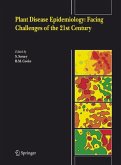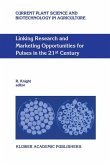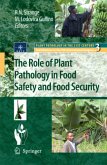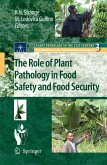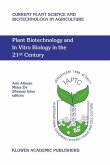Plant Diseases and Food Security in the 21st Century
Herausgegeben:Scott, Peter; Strange, Richard; Korsten, Lise; Gullino, Maria Lodovica
Plant Diseases and Food Security in the 21st Century
Herausgegeben:Scott, Peter; Strange, Richard; Korsten, Lise; Gullino, Maria Lodovica
- Broschiertes Buch
- Merkliste
- Auf die Merkliste
- Bewerten Bewerten
- Teilen
- Produkt teilen
- Produkterinnerung
- Produkterinnerung
Of the global population of more than 7 billion people, some 800 million do not have enough to eat today. By 2050, the population is expected to exceed 9 billion. It has been estimated that some 15% of food production is lost to plant diseases; in developing countries losses may be much higher.
Historically, plant diseases have had catastrophic impact on food production. For example: potato blight caused the Irish famine in 1845; brown spot of rice caused the Great Bengal Famine of 1943; southern corn leaf blight caused a devastating epidemic on the US corn crop in 1970. Food security is…mehr
Andere Kunden interessierten sich auch für
![Plant Diseases and Food Security in the 21st Century Plant Diseases and Food Security in the 21st Century]() Plant Diseases and Food Security in the 21st Century100,99 €
Plant Diseases and Food Security in the 21st Century100,99 €![Plant Disease Epidemiology: Facing Challenges of the 21st Century Plant Disease Epidemiology: Facing Challenges of the 21st Century]() Plant Disease Epidemiology: Facing Challenges of the 21st Century75,99 €
Plant Disease Epidemiology: Facing Challenges of the 21st Century75,99 €![Plant Disease Epidemiology: Facing Challenges of the 21st Century Plant Disease Epidemiology: Facing Challenges of the 21st Century]() S. Savary / B.M. Cooke (eds.)Plant Disease Epidemiology: Facing Challenges of the 21st Century81,99 €
S. Savary / B.M. Cooke (eds.)Plant Disease Epidemiology: Facing Challenges of the 21st Century81,99 €![Linking Research and Marketing Opportunities for Pulses in the 21st Century Linking Research and Marketing Opportunities for Pulses in the 21st Century]() R. Knight (Hrsg.)Linking Research and Marketing Opportunities for Pulses in the 21st Century163,99 €
R. Knight (Hrsg.)Linking Research and Marketing Opportunities for Pulses in the 21st Century163,99 €![The Role of Plant Pathology in Food Safety and Food Security The Role of Plant Pathology in Food Safety and Food Security]() The Role of Plant Pathology in Food Safety and Food Security112,99 €
The Role of Plant Pathology in Food Safety and Food Security112,99 €![The Role of Plant Pathology in Food Safety and Food Security The Role of Plant Pathology in Food Safety and Food Security]() R.N. Strange / Maria Lodovica Gullino (ed.)The Role of Plant Pathology in Food Safety and Food Security116,99 €
R.N. Strange / Maria Lodovica Gullino (ed.)The Role of Plant Pathology in Food Safety and Food Security116,99 €![Plant Biotechnology and In Vitro Biology in the 21st Century Plant Biotechnology and In Vitro Biology in the 21st Century]() Arie Altman / Meira Ziv / Shamay Izhar (Hgg.)Plant Biotechnology and In Vitro Biology in the 21st Century243,99 €
Arie Altman / Meira Ziv / Shamay Izhar (Hgg.)Plant Biotechnology and In Vitro Biology in the 21st Century243,99 €-
-
-
Of the global population of more than 7 billion people, some 800 million do not have enough to eat today. By 2050, the population is expected to exceed 9 billion. It has been estimated that some 15% of food production is lost to plant diseases; in developing countries losses may be much higher.
Historically, plant diseases have had catastrophic impact on food production. For example: potato blight caused the Irish famine in 1845; brown spot of rice caused the Great Bengal Famine of 1943; southern corn leaf blight caused a devastating epidemic on the US corn crop in 1970. Food security is threatened by an ongoing sequence of plant diseases, some persistent for decades or centuries, others more opportunistic. Wheat blast and banana xanthomonas wilt are two contrasting examples of many that currently threaten food production. Other emerging diseases will follow. The proposed title aims to provide a synthesis of expert knowledge to address this central challenge to food security for the 21st century.
Chapters [5] and [11] are available open access under a Creative Commons Attribution 4.0 International License via link.springer.com.
Historically, plant diseases have had catastrophic impact on food production. For example: potato blight caused the Irish famine in 1845; brown spot of rice caused the Great Bengal Famine of 1943; southern corn leaf blight caused a devastating epidemic on the US corn crop in 1970. Food security is threatened by an ongoing sequence of plant diseases, some persistent for decades or centuries, others more opportunistic. Wheat blast and banana xanthomonas wilt are two contrasting examples of many that currently threaten food production. Other emerging diseases will follow. The proposed title aims to provide a synthesis of expert knowledge to address this central challenge to food security for the 21st century.
Chapters [5] and [11] are available open access under a Creative Commons Attribution 4.0 International License via link.springer.com.
Produktdetails
- Produktdetails
- Plant Pathology in the 21st Century 10
- Verlag: Springer / Springer International Publishing / Springer, Berlin
- Artikelnr. des Verlages: 978-3-030-57901-2
- 1st edition 2021
- Seitenzahl: 300
- Erscheinungstermin: 24. Mai 2022
- Englisch
- Abmessung: 235mm x 155mm x 17mm
- Gewicht: 458g
- ISBN-13: 9783030579012
- ISBN-10: 3030579018
- Artikelnr.: 63901878
- Herstellerkennzeichnung Die Herstellerinformationen sind derzeit nicht verfügbar.
- Plant Pathology in the 21st Century 10
- Verlag: Springer / Springer International Publishing / Springer, Berlin
- Artikelnr. des Verlages: 978-3-030-57901-2
- 1st edition 2021
- Seitenzahl: 300
- Erscheinungstermin: 24. Mai 2022
- Englisch
- Abmessung: 235mm x 155mm x 17mm
- Gewicht: 458g
- ISBN-13: 9783030579012
- ISBN-10: 3030579018
- Artikelnr.: 63901878
- Herstellerkennzeichnung Die Herstellerinformationen sind derzeit nicht verfügbar.
Peter Scott is a retired plant pathologist with a research background in plant disease resistance. Based for 20 years at the former Plant Breeding Institute, Cambridge, UK he was part of a team of pathologists and breeders focused on management of cereal diseases. He then moved into the field of digital knowledge management at CAB International, Wallingford, UK. He led a global programme to develop the encyclopaedic Crop Protection Compendium and then a series of Compendia on forestry, animal health, aquaculture and invasive species. He remains a plant pathologist at heart. He was a Founding Member of the British Society for Plant Pathology (BSPP). He was Chairman of the 1998 International Congress of Plant Pathology, and led the foundation of the Commission on Global Food Security of the International Society for Plant Pathology (ISPP). He has served as President of BSPP and of ISPP. Richard Strange was attracted to plant pathology byits relevance to food security and its excitement as a subject for research, which he pursued for the majority of his professional life at University College London, publishing over 100 papers and two books. He is a Fellow of the International Society for Plant Pathology (ISPP) and has been involved in numerous overseas projects, several of which were located in African countries. He has supervised Ph.D. students from these and other countries of the developing world in topics directly concerned with plant disease problems affecting their food security. After retirement he co-founded, with Peter Scott, ISPP's international journal Food Security, acting as Editor-in-Chief for the first decade of its existence. Lise Korsten is Professor in the Department of Plant Sciences, Department of Science and Technology, University of Pretoria, and Co-Director of the Centre of Excellence in Food Security where she is responsible for the food safety and regulatory control programmes. She is a chief editor of the journal Crop Protection and Chair of the Commission on Global Food Security of the International Society for Plant Pathology. HHHHer research is centered on postharvest technology and food safety as related to international trade in fresh produce. Maria Lodovica Gullino has spent her career at the University of Torino, where she is now Vice-Rector for International Affairs, and Professor of Biological and Integrated Plant Disease. She is the founder and Director of AGROINNOVA, the University's research and communication centre for agricultural innovation. Her research interests focus on biological and integrated control of diseases, seed health, crop biosecurity, effect of climate change on plant diseases, and sustainable agriculture. She coordinates a number of international research projects, with special interests in China. She is active in teaching, communication, journalism and the media. She has served as President of the International Society for Plant Pathology (ISPP) and the Italian Society for Crop Protection. She coordinates the ISPP book series Plant Pathology in the 21st Century, of which this volume is the 10th.
Part 1. Crop Diseases Threaten Global Food Security. Chapter 1: Potatoes, citrus and coffee under threat(Jean Beagle Ristaino).- Chapter 2: Gone bananas? Current and future impact of Fusarium wilt on production (Randy C. Ploetz).- Part II: Emerging plant diseases and global food security : Chapter 3: Plant diseases, global food security and the role of R. Glenn Anderson (S. Rajaram, H. J. Dubin).- Chapter 4: Optimising reactive disease management using spatially explicit models at the landscape scale (Frédéric Fabre, Jérôme Coville, Nik J. Cunniffe).- Chapter 5: Challenge of virus disease threats to ensuring sustained uptake of vitamin-A-rich sweetpotato in Africa (Jan Kreuze, Wilmer Cuellar, Jan Low).- Part III: Global impacts of plant disease epidemics. Chapter 6: The impact of rice diseases in tropical Asia(N.P. Castilla, J.B. Macasero, J.E. Villa, A.H. Sparks, L. Willocqu, S. Savary).- Chapter 7: Importance of Fusarium spp. in wheat to food security: a global perspective(Toni Petronaitis, Steven Simpfendorfer, Daniel Hüberli).- Chapter 8: Quantitative assessment of consequences of quarantine plant pathogen introductions: from crop losses to environmental impact (Michael Jeger, Giuseppe Stancanelli, Gianni Gilioli, Gregor Urek, Ariena van Bruggen, Jean-Claude Grégoire, Vittorio Rossi, Wopke van der Werf, Alan MacLeod, Gritta Schader, Sybren Vos, Svetla Kozelska, Marco Pautasso, Ciro Gardi, Olaf-Mosbach-Schulz).- Part IV: Innovative techniques for monitoring emerging diseases. Chapter 9: Diagnosis and assessment of some fungal pathogens of rice: novel methods bring new opportunities (Sara Franco Ortega, Davide Spadaro, Maria Lodovica Gullino).- Chapter 10: Automated detection of 'Ca. Liberibacter asiaticus' infection in citrus using immune tissue prints and machine learning(Jonathan Shao, Fang Ding, Shimin Fu, John S. Hartung).- Chapter 11:Plantwise: a knowledge and intelligence tool for food security through crop protection (Claire Beverley, Manju Thakur).- Part V: Plant diseases and food safety. Chapter 12: Pesticide residues in food: a never-ending challenge (Carmen Tiu).- Chapter 13: How can plant pathology help in the control of human pathogens associated with edible crop plants?(Nicola Holden).
Part 1. Crop Diseases Threaten Global Food Security. Chapter 1: Potatoes, citrus and coffee under threat(Jean Beagle Ristaino).- Chapter 2: Gone bananas? Current and future impact of Fusarium wilt on production (Randy C. Ploetz).- Part II: Emerging plant diseases and global food security : Chapter 3: Plant diseases, global food security and the role of R. Glenn Anderson (S. Rajaram, H. J. Dubin).- Chapter 4: Optimising reactive disease management using spatially explicit models at the landscape scale (Frédéric Fabre, Jérôme Coville, Nik J. Cunniffe).- Chapter 5: Challenge of virus disease threats to ensuring sustained uptake of vitamin-A-rich sweetpotato in Africa (Jan Kreuze, Wilmer Cuellar, Jan Low).- Part III: Global impacts of plant disease epidemics. Chapter 6: The impact of rice diseases in tropical Asia(N.P. Castilla, J.B. Macasero, J.E. Villa, A.H. Sparks, L. Willocqu, S. Savary).- Chapter 7: Importance of Fusarium spp. in wheat to food security: a global perspective(Toni Petronaitis, Steven Simpfendorfer, Daniel Hüberli).- Chapter 8: Quantitative assessment of consequences of quarantine plant pathogen introductions: from crop losses to environmental impact (Michael Jeger, Giuseppe Stancanelli, Gianni Gilioli, Gregor Urek, Ariena van Bruggen, Jean-Claude Grégoire, Vittorio Rossi, Wopke van der Werf, Alan MacLeod, Gritta Schader, Sybren Vos, Svetla Kozelska, Marco Pautasso, Ciro Gardi, Olaf-Mosbach-Schulz).- Part IV: Innovative techniques for monitoring emerging diseases. Chapter 9: Diagnosis and assessment of some fungal pathogens of rice: novel methods bring new opportunities (Sara Franco Ortega, Davide Spadaro, Maria Lodovica Gullino).- Chapter 10: Automated detection of 'Ca. Liberibacter asiaticus' infection in citrus using immune tissue prints and machine learning(Jonathan Shao, Fang Ding, Shimin Fu, John S. Hartung).- Chapter 11:Plantwise: a knowledge and intelligence tool for food security through crop protection (Claire Beverley, Manju Thakur).- Part V: Plant diseases and food safety. Chapter 12: Pesticide residues in food: a never-ending challenge (Carmen Tiu).- Chapter 13: How can plant pathology help in the control of human pathogens associated with edible crop plants?(Nicola Holden).

